Tufts Poetry Awards 2018: Giving Voice to the Voiceless
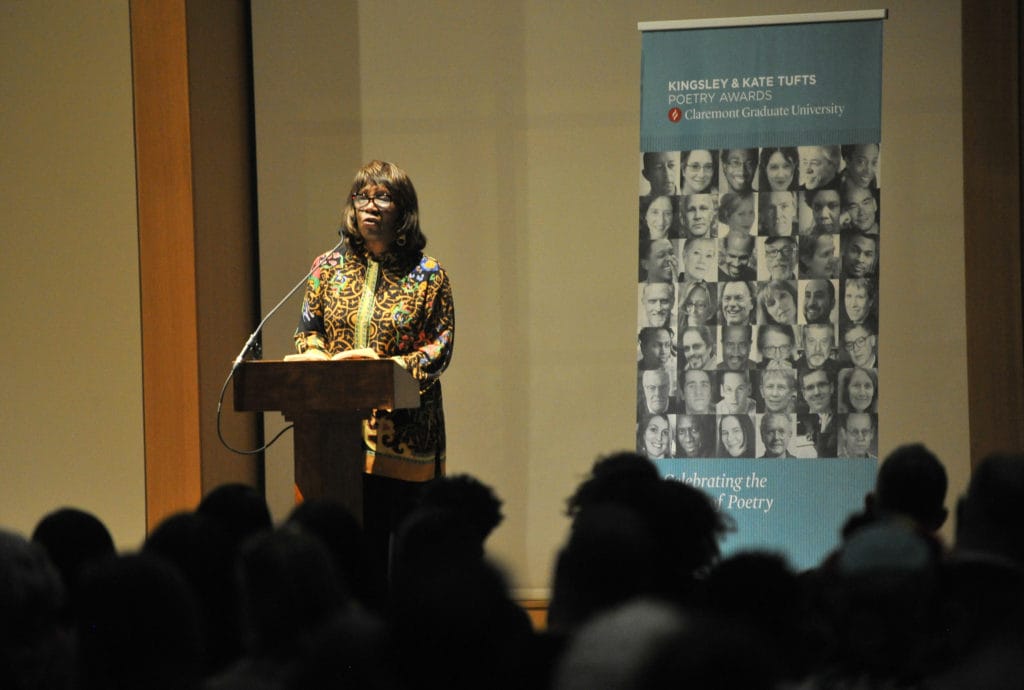
Words can create silence.
As Patricia Smith did when she read one of her poems to a crowd of several hundred people gathered at the Huntington Library in April. The reading by Smith, whose collection Incendiary Art won this year’s Kingsley Tufts Poetry Award, left the audience in a mesmerized hush.
Smith and Donika Kelly, who won the Kate Tufts Discovery Award, were feted with a two-day celebration consisting of a private dinner at the university’s 100-year-old President’s House and a public reading at the Huntington Library and Gardens. (For more on the event at the President’s House, read Emily Schuck’s post on the Kingsley & Kate Tufts Poetry Blog.)
The fact that the second event took place at the former estate of a railroad tycoon who became a great collector and supporter of art was not lost on Patrick Mason, dean of CGU’s School of Arts & Humanities. As he welcomed attendees to the event, Mason emphasized the vital necessity of patronage and programs such as the Tufts Poetry Awards in supporting today’s working artists.
“Florentine artists worked in a community of patrons and supporters who made it possible for their genius to flourish. They were nurtured,” Mason explained. “Tonight we gather thanks to the convergence of three institutions—CGU, the Huntington, and the Tufts awards—that nurture sustain and protect the arts and humanities in our culture.”
Loading...
Mason was followed by the director of the Tufts Poetry Awards, Lori Anne Ferrell, who described the improbable chain of events that led to the establishment of one of the world’s preeminent poetry awards in the early 1990s at what was then known as the Claremont Graduate School.
“We are justly and inordinately proud of being the home for an extraordinary bequest from an extraordinary woman, Kate Tufts,” said Ferrell, who also serves as the John D. and Lillian Maguire Distinguished Professor in the Humanities.
More than a quarter-century ago, Kate Tufts “started looking around for a school that would help her pay tribute to her great love for her husband and the poetry he both loved and wrote—on the off hours … and therein lies the tale,” Ferrell said.
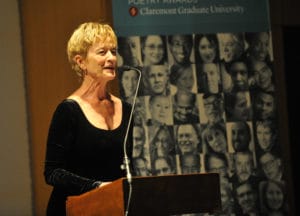
Ferrell described how Kate’s husband, Kingsley, dreamed of writing poetry full time, “but of course he had bills to pay,” she said.
Mindful that many poets sacrifice their art for similar economic reasons, Kate Tufts was determined to honor her husband, and that determination resulted in an endowed prize that recognizes two poets at different stages of their art. The $100,000 Kingsley Tufts Award is given for a book of poetry by a poet in mid-career, and the $10,000 Kate Tufts Discovery Award for a first book by a poet of genuine promise. Each year, hundreds of titles are submitted for consideration in a process overseen by Ferrell and Genevieve Kaplan, Tufts Poetry Awards coordinator.
Voices of Fury
Following Ferrell, Kelly and Smith were introduced by Elena Byrne, a poet and member of the Tufts judging committee, and by the committee’s chair, Don Share, the editor of Poetry magazine.
A professor at St. Bonaventure University, Kelly read first, and she acknowledged that the Kate Tufts Discovery Award represents “an investment in my future as a poet.”
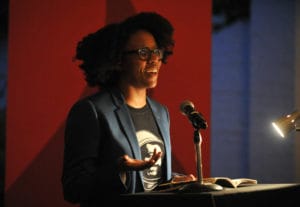
She read several new poems as well as from Bestiary, including “Fourth Grade Autobiography,” which blends happy childhood memories with vague, unsettling ones:
…Saturday
dance parties. Everyone drunk on pink
panties, screwdrivers, and Canadian Club.
Dominoes and spades. Al Green and Mack 10.
Sometimes Mama dances with the dog.
Sometimes my dad dances with me. I am
careful not to touch. He is careful
to smile with his whole face.
When Share introduced Smith, he smiled and said that she was having a very good week because she had just been nominated for a Pulitzer Prize in poetry.
“That’s right, it has been a very good week,” Smith chuckled as she took the podium and gestured at a banner of past Tufts winners behind her. “What I’ve taken note of the last few days is this sense of being, of being asked to join this family. There’s a lineage here… I really feel like I fit into this circle of arms now, and I’m really appreciative of that because poets don’t get much of that.”
During her introductory remarks, Smith’s voice was soft and gentle as she expressed thanks. But when she began her reading, everything changed.
She started with “Sagas of the Accidental Saint,” one of the major movements in Incendiary Art, and her voice exploded with barely restrained fury:
I don’t expect you’ll recognize my voice.
I don’t believe this saga I’ve suppressed
will ever sound familiar. I am just
a stooped and accidental saint, no choice
except to strain the limits of my throat.
I am the mama weep beneath the fold,
that paragraph you skip, the wink of gold
inside a rotted mouth, that shredding note
of grief.
The book, she told the audience, gives voice to the grief of African American mothers who have lost their sons and daughters in waves of violence sweeping the country “many times, but not always, at the hands of police,” she said. Smith is as much a performer as a poet, and when she was finished, the audience sat in stunned silence.
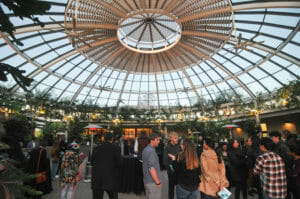
In addition to Schuck’s piece on the Tufts blog, the Huntington ceremony is described in a piece published in the Pasadena Star-News by Larry Wilson, public editor of the San Gabriel Valley Newspapers and a member of the Tufts Advisory Committee.
“As I looked down the row of chairs” at the attendees, Wilson writes, he “reflected yet again on how having a world-class university in a town so changes its culture, always for the better.”
Honoring Her Husband, Helping Future Poets
On both nights Ferrell described how the arrival of the awards at CGU hinged on a single gesture: answering a phone call.
After Kate Tufts decided to endow a poetry award, she wanted to help poets “turn their avocation into vocation,” Ferrell explained, “and she contacted several institutions that didn’t return her call.”
But one person did: John Maguire, who was then the president of Claremont Graduate School. Ferrell praised Kate Tufts’ vision and commitment to the arts in a world increasingly in need of its healing powers.
Before leaving the podium, Ferrell made sure that the audience understood something else about Kate Tufts: that she was “eminently quotable.”
“’I just wanted to give poets a little something to help them’ Kate would say,” Ferrell told the audience, smiling. “That little something is really something.”
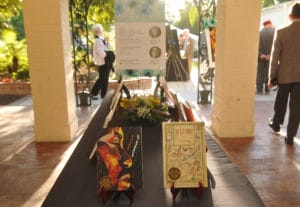
Watch the 2018 Kingsley & Kate Tufts Poetry Awards reading at the Huntington